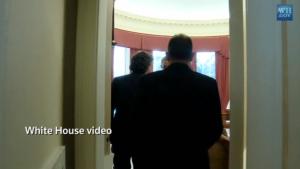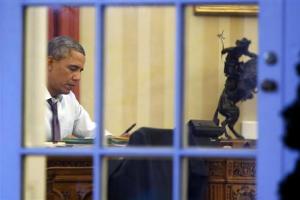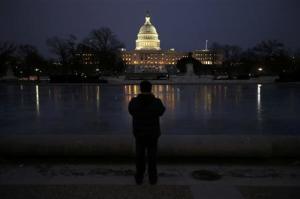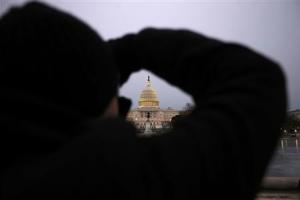JohnButts@JBMedia - Reports:
President Barack Obama will lay out his strategy for getting around a divided Congress starting with a
wage hike for federal contract workers in a State of the Union speech on
Tuesday that reflects scaled-back legislative ambitions after a tough
year.
Obama will say in his 9 p.m. EST (0200 GMT Wednesday) address that he will bypass fractious
U.S. lawmakers and go it alone in some areas with a series of executive
actions aimed at boosting the middle class, many that do not require
congressional approval.
actions aimed at boosting the middle class, many that do not require
congressional approval.
Trying to breathe new life into his presidency and boost congressional
Democrats facing re-election battles in November, Obama will tell
Congress he is eager to work with lawmakers, "but America does not stand
still - and neither will I."
Democrats facing re-election battles in November, Obama will tell
Congress he is eager to work with lawmakers, "but America does not stand
still - and neither will I."
"So wherever and whenever I can take steps without legislation to
expand opportunity for more American families, that's what I'm going to
do," Obama will say, according to speech excerpts released by the White
House.
expand opportunity for more American families, that's what I'm going to
do," Obama will say, according to speech excerpts released by the White
House.
The White House said Obama would announce that he is issuing an executive order to raise the
minimum wage to $10.10 an hour for federal contract workers with new
contracts.
wage for all workers to $10.10 an hour from $7.25 and index that to
inflation.
inflation.
 The executive order raising the level for federal contract workers, which applies to
The executive order raising the level for federal contract workers, which applies to new contracts or existing contracts in which terms are being changed,
will take effect at the beginning of next year, with janitors and
construction workers among the beneficiaries.
Issuing the order allows the Democratic president to bypass Congress,
where Republicans oppose a broad increase in the minimum wage. But
liberals felt Obama's move did not go far enough, arguing that he should
have extended the wage hike to existing federal contracts.
where Republicans oppose a broad increase in the minimum wage. But
liberals felt Obama's move did not go far enough, arguing that he should
have extended the wage hike to existing federal contracts.
"This action, while a step forward, suggests he may still be unwilling
to take the fighting stance necessary to deliver the big wins over
growing inequality that our country desperately needs," said Jim Dean,
chairman of the liberal advocacy group Democracy for America.
to take the fighting stance necessary to deliver the big wins over
growing inequality that our country desperately needs," said Jim Dean,
chairman of the liberal advocacy group Democracy for America.
White House officials said Obama would also announce new executive
actions on retirement security and job training to help middle-class
workers expand economic opportunity.
actions on retirement security and job training to help middle-class
workers expand economic opportunity.
Obama will say he is
offering a set of "concrete, practical proposals" to speed up economic
growth and strengthen the middle class, which he says has lost jobs
because of shifts in technology and global competition.
"Today, offering a set of "concrete, practical proposals" to speed up economic
growth and strengthen the middle class, which he says has lost jobs
because of shifts in technology and global competition.
after four years of economic growth, corporate profits and stock prices
have rarely been higher, and those at the top have never done better.
But average wages have barely budged. Inequality has deepened. Upward
mobility has stalled," Obama will say, according to the excerpts.
"The cold, hard fact is that even in the midst of recovery, too many
Americans are working more than ever just to get by - let alone get
ahead. And too many still aren't working at all," Obama also said in the
excerpts.
REDUCED AMBITIONS
With three years left in
office, Obama has effectively reduced for now his ambitions for grand
legislative actions, having already seen many proposals blocked in a
Congress in which Democrats control the Senate and Republicans run the
House of Representatives.
View gallery
Obama is expected to renew his appeal for a long-stalled
overhaul of U.S. immigration policy that has been stymied by
congressional Republicans. He also will promote his signature healthcare
law, four months after its disastrous initial rollout.
Republicans clambered for some of the same rhetorical ground as Obama in
pledging to narrow the gap between rich and poor but staked out a
different vision for doing so.
"It's one that champions free
markets and trusts people to make their own decisions, not a government
that decides for you," Representative Cathy McMorris Rodgers, chairwoman
of the House Republican Caucus, said in her party's response to Obama's
speech. "It helps working families rise above the limits of poverty and
protects our most vulnerable."
White House officials said the president would try to work with
Congress to accomplish his agenda, but would also try to advance it
through executive actions if necessary.
Congressional Republicans expressed skepticism.Congress to accomplish his agenda, but would also try to advance it
through executive actions if necessary.
View gallery
House Speaker John Boehner, the top Republican in Congress, said that while Obama may have
the authority to raise the minimum wage on federal contracts, the impact
will be "close to zero" because it will only affect future contracts.
harm the economy. "When you raise the cost of something, you get less of
it," Boehner told a news conference after a party meeting near the U.S.
Capitol. "And we know from increases in the minimum wage in the past,
that hundreds of thousands of low-income Americans have lost their
jobs."
'COMES DOWN TO ECONOMIC ISSUES'
Obama is trying to
recover from a difficult fifth year in office, when immigration and gun
control legislation failed to advance in Congress, his healthcare law
struggled out of the starting gate, and he appeared uncertain about how
to respond to Syria's civil war.
Polls reflect a dissatisfied and
gloomy country. An NBC News/Wall Street Journal poll released on
Tuesday showed 68 percent of Americans saying the country is either
stagnant or worse off since Obama took office. People used words like
"divided," "troubled" and "deteriorating" to describe the state of the
country, the poll showed.
A central theme of the address, Obama's
sixth such annual speech in the House chamber, is addressing income
inequality, as middle-class Americans struggle to get ahead even while
wealthier people prosper in the uneven economic recovery.
"It comes down to economic issues," said Andy Smith, director of the
University of New Hampshire Survey Center. "The economy is going to be
the thing that determines whether people have confidence in the
president. If the economy is doing well, people will forgive a lot of
the things the president has done or not done."
Attending the speech will be a variety of Americans who will sit in the
gallery with the president's wife, Michelle Obama, symbolizing issues
important to the White House. They will include heroes from last year's
Boston Marathon bombings, a firefighter who led the rescue response to
an Oklahoma tornado, and an openly gay basketball player.
gallery with the president's wife, Michelle Obama, symbolizing issues
important to the White House. They will include heroes from last year's
Boston Marathon bombings, a firefighter who led the rescue response to
an Oklahoma tornado, and an openly gay basketball player.
One of Obama's goals is to lay out ideas that Democratic congressional
candidates can adopt in the run-up to November elections as they try to
hold on to their Senate majority and challenge Republicans for control
of the House.
candidates can adopt in the run-up to November elections as they try to
hold on to their Senate majority and challenge Republicans for control
of the House.
Obama will talk up themes from the speech in a two-day road trip starting on Wednesday
that will include stops in Maryland, Pennsylvania, Wisconsin and
Tennessee.









